Authentic Leadership, LMX and Psychological Capital: A Critical Analysis
VerifiedAdded on 2023/05/29
|10
|2813
|181
AI Summary
The report analyses the relationship between authentic leadership, LMX and psychological capital of employees. It also suggests ways to increase the psychological capital of employees and the impact of emotions of leaders on employee performance.
Contribute Materials
Your contribution can guide someone’s learning journey. Share your
documents today.
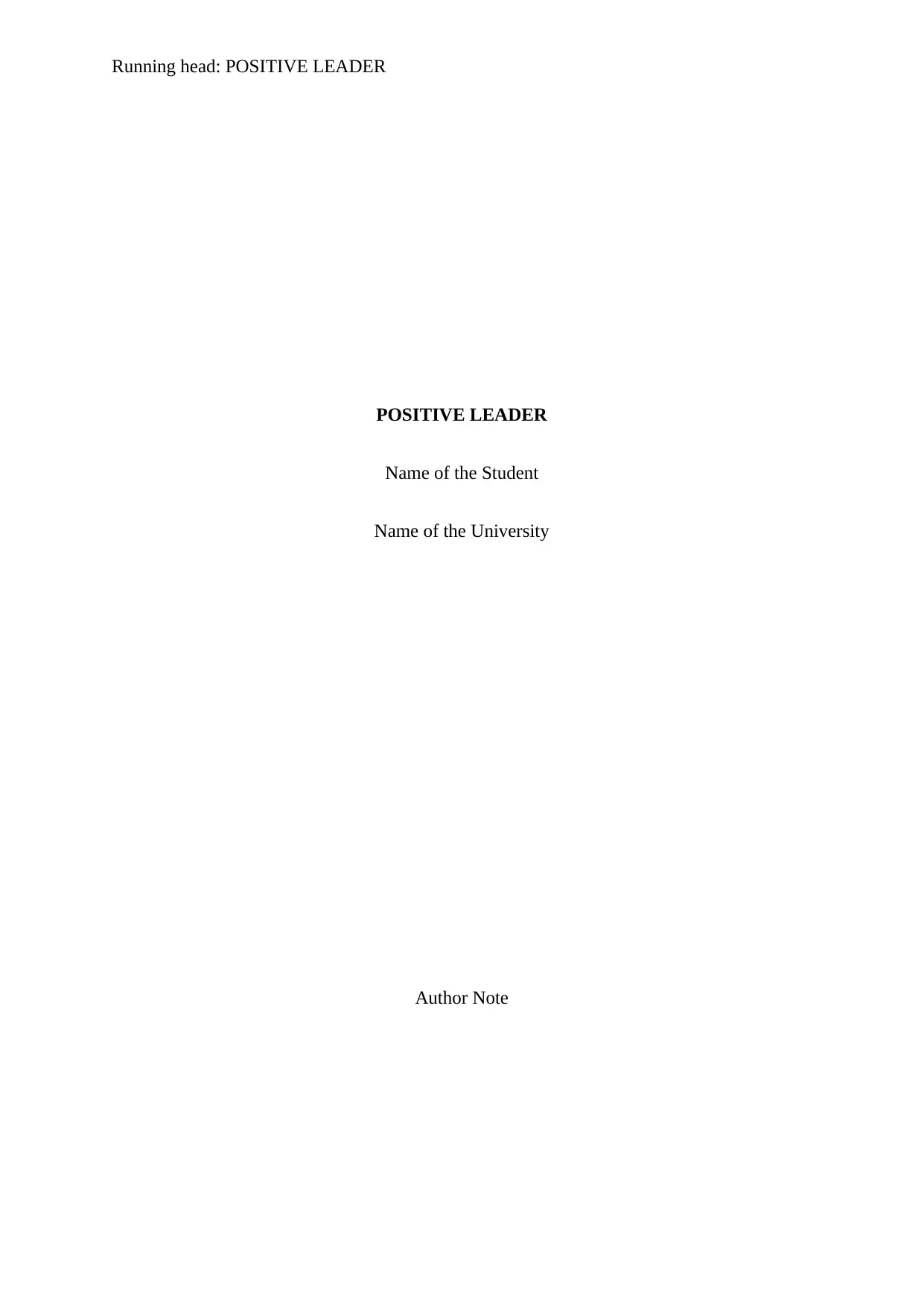
Running head: POSITIVE LEADER
POSITIVE LEADER
Name of the Student
Name of the University
Author Note
POSITIVE LEADER
Name of the Student
Name of the University
Author Note
Secure Best Marks with AI Grader
Need help grading? Try our AI Grader for instant feedback on your assignments.
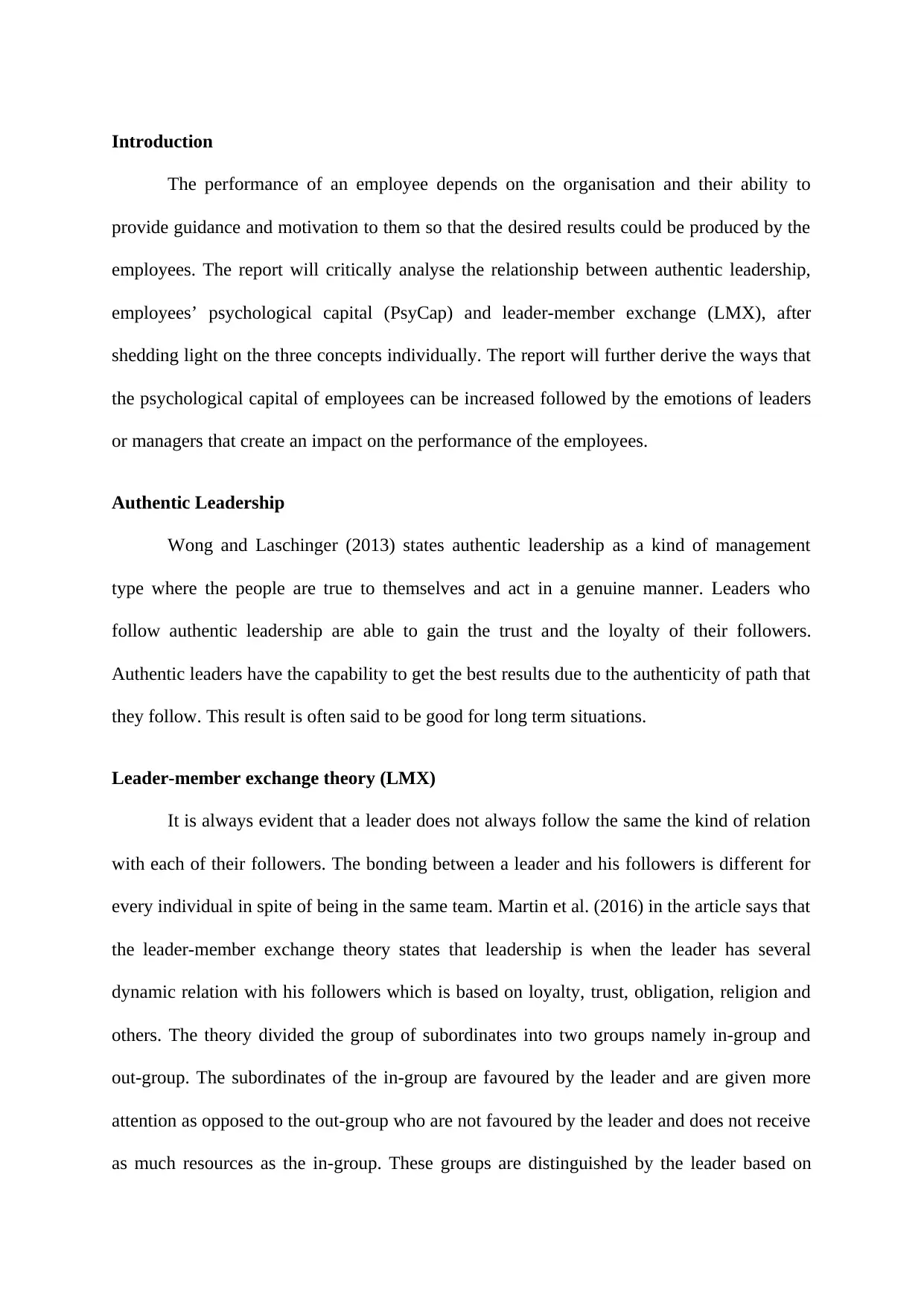
Introduction
The performance of an employee depends on the organisation and their ability to
provide guidance and motivation to them so that the desired results could be produced by the
employees. The report will critically analyse the relationship between authentic leadership,
employees’ psychological capital (PsyCap) and leader-member exchange (LMX), after
shedding light on the three concepts individually. The report will further derive the ways that
the psychological capital of employees can be increased followed by the emotions of leaders
or managers that create an impact on the performance of the employees.
Authentic Leadership
Wong and Laschinger (2013) states authentic leadership as a kind of management
type where the people are true to themselves and act in a genuine manner. Leaders who
follow authentic leadership are able to gain the trust and the loyalty of their followers.
Authentic leaders have the capability to get the best results due to the authenticity of path that
they follow. This result is often said to be good for long term situations.
Leader-member exchange theory (LMX)
It is always evident that a leader does not always follow the same the kind of relation
with each of their followers. The bonding between a leader and his followers is different for
every individual in spite of being in the same team. Martin et al. (2016) in the article says that
the leader-member exchange theory states that leadership is when the leader has several
dynamic relation with his followers which is based on loyalty, trust, obligation, religion and
others. The theory divided the group of subordinates into two groups namely in-group and
out-group. The subordinates of the in-group are favoured by the leader and are given more
attention as opposed to the out-group who are not favoured by the leader and does not receive
as much resources as the in-group. These groups are distinguished by the leader based on
The performance of an employee depends on the organisation and their ability to
provide guidance and motivation to them so that the desired results could be produced by the
employees. The report will critically analyse the relationship between authentic leadership,
employees’ psychological capital (PsyCap) and leader-member exchange (LMX), after
shedding light on the three concepts individually. The report will further derive the ways that
the psychological capital of employees can be increased followed by the emotions of leaders
or managers that create an impact on the performance of the employees.
Authentic Leadership
Wong and Laschinger (2013) states authentic leadership as a kind of management
type where the people are true to themselves and act in a genuine manner. Leaders who
follow authentic leadership are able to gain the trust and the loyalty of their followers.
Authentic leaders have the capability to get the best results due to the authenticity of path that
they follow. This result is often said to be good for long term situations.
Leader-member exchange theory (LMX)
It is always evident that a leader does not always follow the same the kind of relation
with each of their followers. The bonding between a leader and his followers is different for
every individual in spite of being in the same team. Martin et al. (2016) in the article says that
the leader-member exchange theory states that leadership is when the leader has several
dynamic relation with his followers which is based on loyalty, trust, obligation, religion and
others. The theory divided the group of subordinates into two groups namely in-group and
out-group. The subordinates of the in-group are favoured by the leader and are given more
attention as opposed to the out-group who are not favoured by the leader and does not receive
as much resources as the in-group. These groups are distinguished by the leader based on
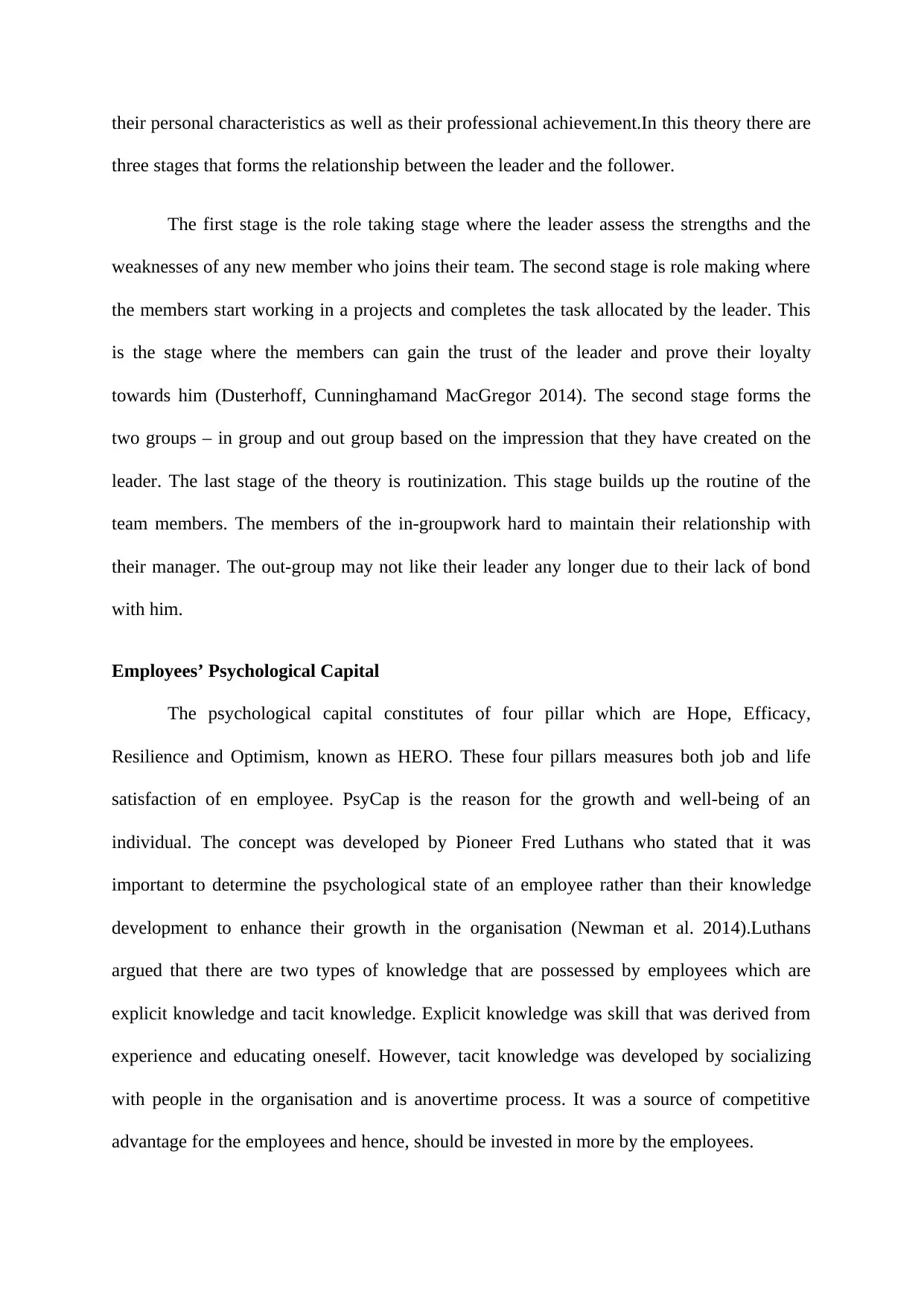
their personal characteristics as well as their professional achievement.In this theory there are
three stages that forms the relationship between the leader and the follower.
The first stage is the role taking stage where the leader assess the strengths and the
weaknesses of any new member who joins their team. The second stage is role making where
the members start working in a projects and completes the task allocated by the leader. This
is the stage where the members can gain the trust of the leader and prove their loyalty
towards him (Dusterhoff, Cunninghamand MacGregor 2014). The second stage forms the
two groups – in group and out group based on the impression that they have created on the
leader. The last stage of the theory is routinization. This stage builds up the routine of the
team members. The members of the in-groupwork hard to maintain their relationship with
their manager. The out-group may not like their leader any longer due to their lack of bond
with him.
Employees’ Psychological Capital
The psychological capital constitutes of four pillar which are Hope, Efficacy,
Resilience and Optimism, known as HERO. These four pillars measures both job and life
satisfaction of en employee. PsyCap is the reason for the growth and well-being of an
individual. The concept was developed by Pioneer Fred Luthans who stated that it was
important to determine the psychological state of an employee rather than their knowledge
development to enhance their growth in the organisation (Newman et al. 2014).Luthans
argued that there are two types of knowledge that are possessed by employees which are
explicit knowledge and tacit knowledge. Explicit knowledge was skill that was derived from
experience and educating oneself. However, tacit knowledge was developed by socializing
with people in the organisation and is anovertime process. It was a source of competitive
advantage for the employees and hence, should be invested in more by the employees.
three stages that forms the relationship between the leader and the follower.
The first stage is the role taking stage where the leader assess the strengths and the
weaknesses of any new member who joins their team. The second stage is role making where
the members start working in a projects and completes the task allocated by the leader. This
is the stage where the members can gain the trust of the leader and prove their loyalty
towards him (Dusterhoff, Cunninghamand MacGregor 2014). The second stage forms the
two groups – in group and out group based on the impression that they have created on the
leader. The last stage of the theory is routinization. This stage builds up the routine of the
team members. The members of the in-groupwork hard to maintain their relationship with
their manager. The out-group may not like their leader any longer due to their lack of bond
with him.
Employees’ Psychological Capital
The psychological capital constitutes of four pillar which are Hope, Efficacy,
Resilience and Optimism, known as HERO. These four pillars measures both job and life
satisfaction of en employee. PsyCap is the reason for the growth and well-being of an
individual. The concept was developed by Pioneer Fred Luthans who stated that it was
important to determine the psychological state of an employee rather than their knowledge
development to enhance their growth in the organisation (Newman et al. 2014).Luthans
argued that there are two types of knowledge that are possessed by employees which are
explicit knowledge and tacit knowledge. Explicit knowledge was skill that was derived from
experience and educating oneself. However, tacit knowledge was developed by socializing
with people in the organisation and is anovertime process. It was a source of competitive
advantage for the employees and hence, should be invested in more by the employees.
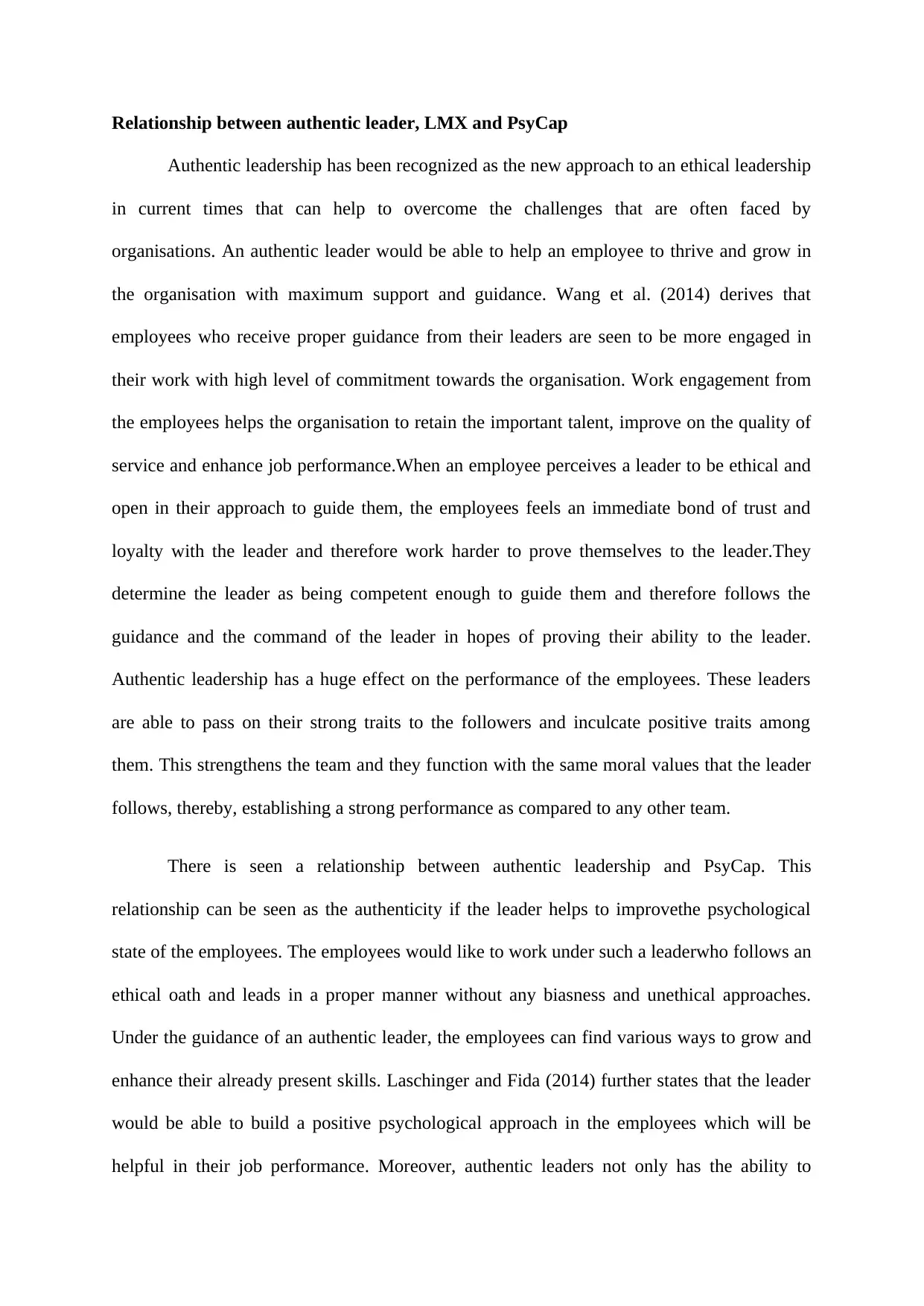
Relationship between authentic leader, LMX and PsyCap
Authentic leadership has been recognized as the new approach to an ethical leadership
in current times that can help to overcome the challenges that are often faced by
organisations. An authentic leader would be able to help an employee to thrive and grow in
the organisation with maximum support and guidance. Wang et al. (2014) derives that
employees who receive proper guidance from their leaders are seen to be more engaged in
their work with high level of commitment towards the organisation. Work engagement from
the employees helps the organisation to retain the important talent, improve on the quality of
service and enhance job performance.When an employee perceives a leader to be ethical and
open in their approach to guide them, the employees feels an immediate bond of trust and
loyalty with the leader and therefore work harder to prove themselves to the leader.They
determine the leader as being competent enough to guide them and therefore follows the
guidance and the command of the leader in hopes of proving their ability to the leader.
Authentic leadership has a huge effect on the performance of the employees. These leaders
are able to pass on their strong traits to the followers and inculcate positive traits among
them. This strengthens the team and they function with the same moral values that the leader
follows, thereby, establishing a strong performance as compared to any other team.
There is seen a relationship between authentic leadership and PsyCap. This
relationship can be seen as the authenticity if the leader helps to improvethe psychological
state of the employees. The employees would like to work under such a leaderwho follows an
ethical oath and leads in a proper manner without any biasness and unethical approaches.
Under the guidance of an authentic leader, the employees can find various ways to grow and
enhance their already present skills. Laschinger and Fida (2014) further states that the leader
would be able to build a positive psychological approach in the employees which will be
helpful in their job performance. Moreover, authentic leaders not only has the ability to
Authentic leadership has been recognized as the new approach to an ethical leadership
in current times that can help to overcome the challenges that are often faced by
organisations. An authentic leader would be able to help an employee to thrive and grow in
the organisation with maximum support and guidance. Wang et al. (2014) derives that
employees who receive proper guidance from their leaders are seen to be more engaged in
their work with high level of commitment towards the organisation. Work engagement from
the employees helps the organisation to retain the important talent, improve on the quality of
service and enhance job performance.When an employee perceives a leader to be ethical and
open in their approach to guide them, the employees feels an immediate bond of trust and
loyalty with the leader and therefore work harder to prove themselves to the leader.They
determine the leader as being competent enough to guide them and therefore follows the
guidance and the command of the leader in hopes of proving their ability to the leader.
Authentic leadership has a huge effect on the performance of the employees. These leaders
are able to pass on their strong traits to the followers and inculcate positive traits among
them. This strengthens the team and they function with the same moral values that the leader
follows, thereby, establishing a strong performance as compared to any other team.
There is seen a relationship between authentic leadership and PsyCap. This
relationship can be seen as the authenticity if the leader helps to improvethe psychological
state of the employees. The employees would like to work under such a leaderwho follows an
ethical oath and leads in a proper manner without any biasness and unethical approaches.
Under the guidance of an authentic leader, the employees can find various ways to grow and
enhance their already present skills. Laschinger and Fida (2014) further states that the leader
would be able to build a positive psychological approach in the employees which will be
helpful in their job performance. Moreover, authentic leaders not only has the ability to
Secure Best Marks with AI Grader
Need help grading? Try our AI Grader for instant feedback on your assignments.
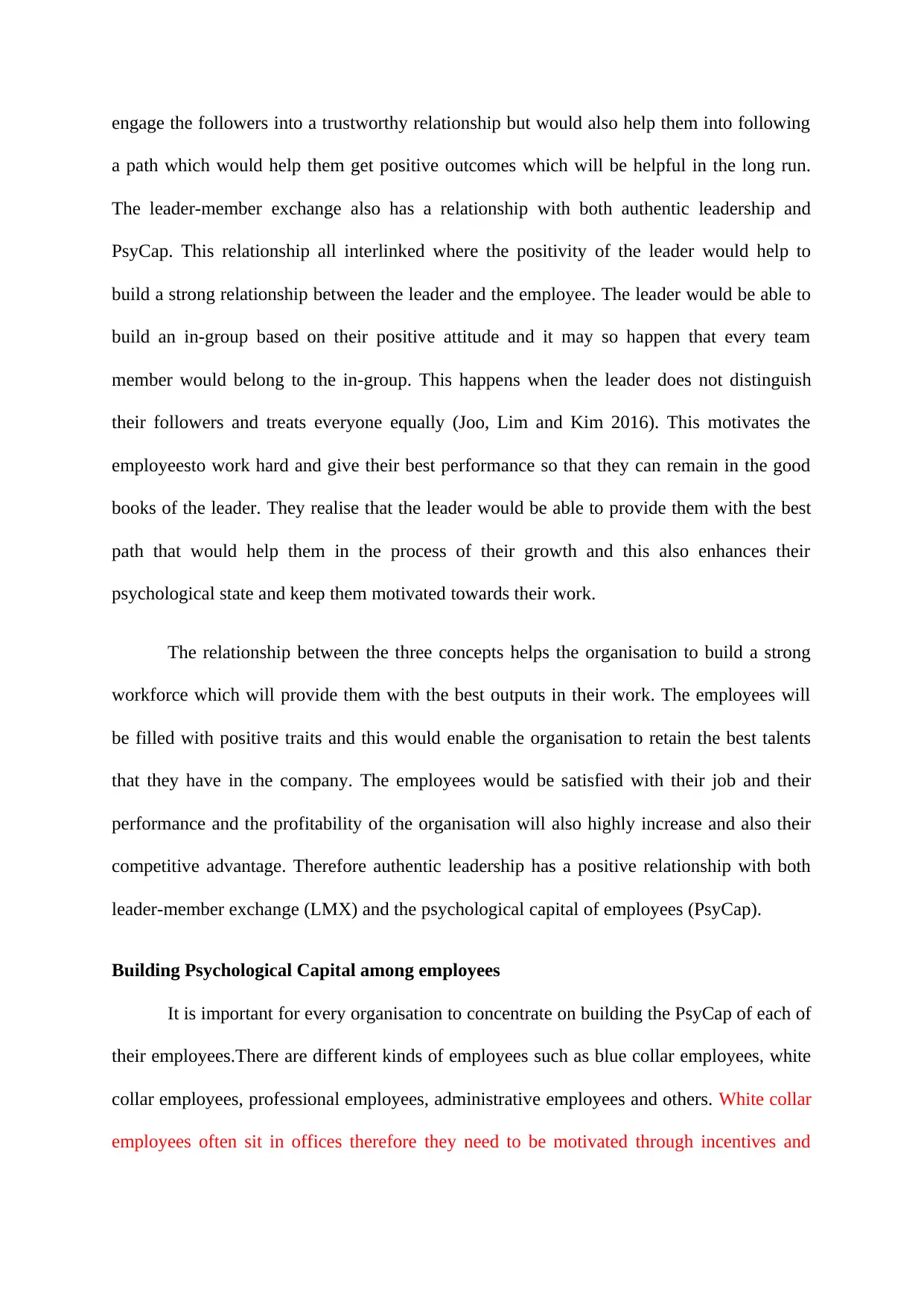
engage the followers into a trustworthy relationship but would also help them into following
a path which would help them get positive outcomes which will be helpful in the long run.
The leader-member exchange also has a relationship with both authentic leadership and
PsyCap. This relationship all interlinked where the positivity of the leader would help to
build a strong relationship between the leader and the employee. The leader would be able to
build an in-group based on their positive attitude and it may so happen that every team
member would belong to the in-group. This happens when the leader does not distinguish
their followers and treats everyone equally (Joo, Lim and Kim 2016). This motivates the
employeesto work hard and give their best performance so that they can remain in the good
books of the leader. They realise that the leader would be able to provide them with the best
path that would help them in the process of their growth and this also enhances their
psychological state and keep them motivated towards their work.
The relationship between the three concepts helps the organisation to build a strong
workforce which will provide them with the best outputs in their work. The employees will
be filled with positive traits and this would enable the organisation to retain the best talents
that they have in the company. The employees would be satisfied with their job and their
performance and the profitability of the organisation will also highly increase and also their
competitive advantage. Therefore authentic leadership has a positive relationship with both
leader-member exchange (LMX) and the psychological capital of employees (PsyCap).
Building Psychological Capital among employees
It is important for every organisation to concentrate on building the PsyCap of each of
their employees.There are different kinds of employees such as blue collar employees, white
collar employees, professional employees, administrative employees and others. White collar
employees often sit in offices therefore they need to be motivated through incentives and
a path which would help them get positive outcomes which will be helpful in the long run.
The leader-member exchange also has a relationship with both authentic leadership and
PsyCap. This relationship all interlinked where the positivity of the leader would help to
build a strong relationship between the leader and the employee. The leader would be able to
build an in-group based on their positive attitude and it may so happen that every team
member would belong to the in-group. This happens when the leader does not distinguish
their followers and treats everyone equally (Joo, Lim and Kim 2016). This motivates the
employeesto work hard and give their best performance so that they can remain in the good
books of the leader. They realise that the leader would be able to provide them with the best
path that would help them in the process of their growth and this also enhances their
psychological state and keep them motivated towards their work.
The relationship between the three concepts helps the organisation to build a strong
workforce which will provide them with the best outputs in their work. The employees will
be filled with positive traits and this would enable the organisation to retain the best talents
that they have in the company. The employees would be satisfied with their job and their
performance and the profitability of the organisation will also highly increase and also their
competitive advantage. Therefore authentic leadership has a positive relationship with both
leader-member exchange (LMX) and the psychological capital of employees (PsyCap).
Building Psychological Capital among employees
It is important for every organisation to concentrate on building the PsyCap of each of
their employees.There are different kinds of employees such as blue collar employees, white
collar employees, professional employees, administrative employees and others. White collar
employees often sit in offices therefore they need to be motivated through incentives and
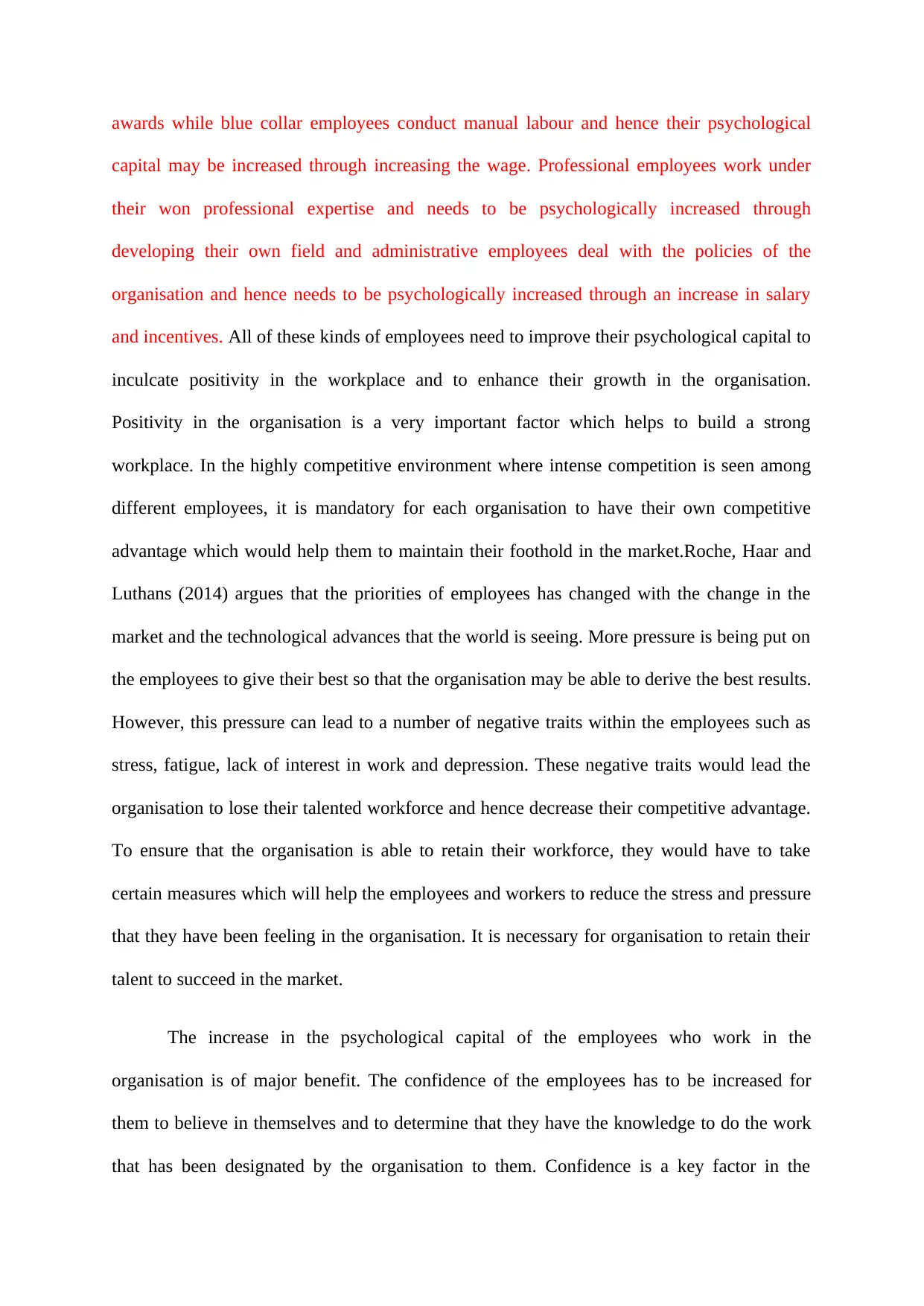
awards while blue collar employees conduct manual labour and hence their psychological
capital may be increased through increasing the wage. Professional employees work under
their won professional expertise and needs to be psychologically increased through
developing their own field and administrative employees deal with the policies of the
organisation and hence needs to be psychologically increased through an increase in salary
and incentives. All of these kinds of employees need to improve their psychological capital to
inculcate positivity in the workplace and to enhance their growth in the organisation.
Positivity in the organisation is a very important factor which helps to build a strong
workplace. In the highly competitive environment where intense competition is seen among
different employees, it is mandatory for each organisation to have their own competitive
advantage which would help them to maintain their foothold in the market.Roche, Haar and
Luthans (2014) argues that the priorities of employees has changed with the change in the
market and the technological advances that the world is seeing. More pressure is being put on
the employees to give their best so that the organisation may be able to derive the best results.
However, this pressure can lead to a number of negative traits within the employees such as
stress, fatigue, lack of interest in work and depression. These negative traits would lead the
organisation to lose their talented workforce and hence decrease their competitive advantage.
To ensure that the organisation is able to retain their workforce, they would have to take
certain measures which will help the employees and workers to reduce the stress and pressure
that they have been feeling in the organisation. It is necessary for organisation to retain their
talent to succeed in the market.
The increase in the psychological capital of the employees who work in the
organisation is of major benefit. The confidence of the employees has to be increased for
them to believe in themselves and to determine that they have the knowledge to do the work
that has been designated by the organisation to them. Confidence is a key factor in the
capital may be increased through increasing the wage. Professional employees work under
their won professional expertise and needs to be psychologically increased through
developing their own field and administrative employees deal with the policies of the
organisation and hence needs to be psychologically increased through an increase in salary
and incentives. All of these kinds of employees need to improve their psychological capital to
inculcate positivity in the workplace and to enhance their growth in the organisation.
Positivity in the organisation is a very important factor which helps to build a strong
workplace. In the highly competitive environment where intense competition is seen among
different employees, it is mandatory for each organisation to have their own competitive
advantage which would help them to maintain their foothold in the market.Roche, Haar and
Luthans (2014) argues that the priorities of employees has changed with the change in the
market and the technological advances that the world is seeing. More pressure is being put on
the employees to give their best so that the organisation may be able to derive the best results.
However, this pressure can lead to a number of negative traits within the employees such as
stress, fatigue, lack of interest in work and depression. These negative traits would lead the
organisation to lose their talented workforce and hence decrease their competitive advantage.
To ensure that the organisation is able to retain their workforce, they would have to take
certain measures which will help the employees and workers to reduce the stress and pressure
that they have been feeling in the organisation. It is necessary for organisation to retain their
talent to succeed in the market.
The increase in the psychological capital of the employees who work in the
organisation is of major benefit. The confidence of the employees has to be increased for
them to believe in themselves and to determine that they have the knowledge to do the work
that has been designated by the organisation to them. Confidence is a key factor in the
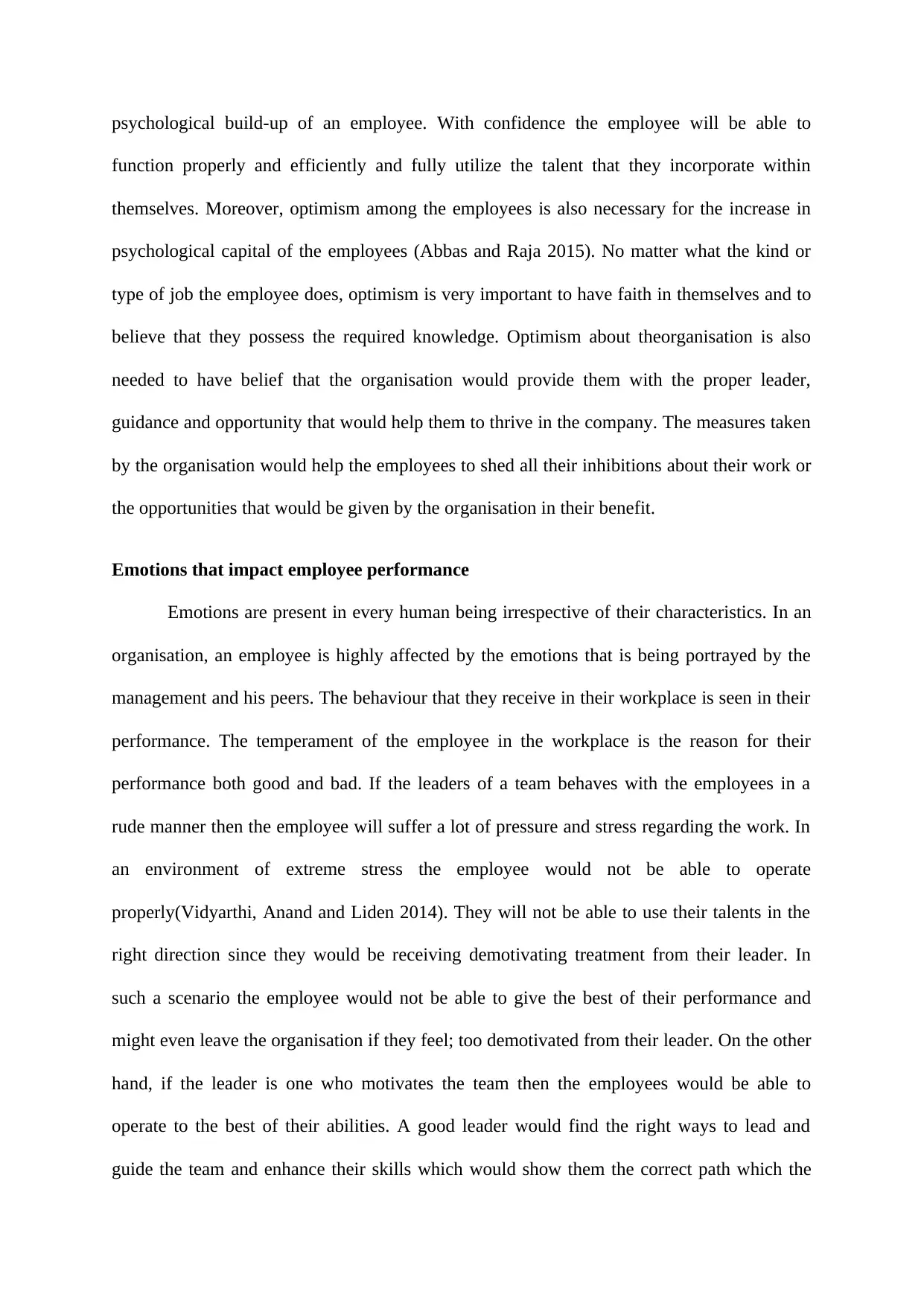
psychological build-up of an employee. With confidence the employee will be able to
function properly and efficiently and fully utilize the talent that they incorporate within
themselves. Moreover, optimism among the employees is also necessary for the increase in
psychological capital of the employees (Abbas and Raja 2015). No matter what the kind or
type of job the employee does, optimism is very important to have faith in themselves and to
believe that they possess the required knowledge. Optimism about theorganisation is also
needed to have belief that the organisation would provide them with the proper leader,
guidance and opportunity that would help them to thrive in the company. The measures taken
by the organisation would help the employees to shed all their inhibitions about their work or
the opportunities that would be given by the organisation in their benefit.
Emotions that impact employee performance
Emotions are present in every human being irrespective of their characteristics. In an
organisation, an employee is highly affected by the emotions that is being portrayed by the
management and his peers. The behaviour that they receive in their workplace is seen in their
performance. The temperament of the employee in the workplace is the reason for their
performance both good and bad. If the leaders of a team behaves with the employees in a
rude manner then the employee will suffer a lot of pressure and stress regarding the work. In
an environment of extreme stress the employee would not be able to operate
properly(Vidyarthi, Anand and Liden 2014). They will not be able to use their talents in the
right direction since they would be receiving demotivating treatment from their leader. In
such a scenario the employee would not be able to give the best of their performance and
might even leave the organisation if they feel; too demotivated from their leader. On the other
hand, if the leader is one who motivates the team then the employees would be able to
operate to the best of their abilities. A good leader would find the right ways to lead and
guide the team and enhance their skills which would show them the correct path which the
function properly and efficiently and fully utilize the talent that they incorporate within
themselves. Moreover, optimism among the employees is also necessary for the increase in
psychological capital of the employees (Abbas and Raja 2015). No matter what the kind or
type of job the employee does, optimism is very important to have faith in themselves and to
believe that they possess the required knowledge. Optimism about theorganisation is also
needed to have belief that the organisation would provide them with the proper leader,
guidance and opportunity that would help them to thrive in the company. The measures taken
by the organisation would help the employees to shed all their inhibitions about their work or
the opportunities that would be given by the organisation in their benefit.
Emotions that impact employee performance
Emotions are present in every human being irrespective of their characteristics. In an
organisation, an employee is highly affected by the emotions that is being portrayed by the
management and his peers. The behaviour that they receive in their workplace is seen in their
performance. The temperament of the employee in the workplace is the reason for their
performance both good and bad. If the leaders of a team behaves with the employees in a
rude manner then the employee will suffer a lot of pressure and stress regarding the work. In
an environment of extreme stress the employee would not be able to operate
properly(Vidyarthi, Anand and Liden 2014). They will not be able to use their talents in the
right direction since they would be receiving demotivating treatment from their leader. In
such a scenario the employee would not be able to give the best of their performance and
might even leave the organisation if they feel; too demotivated from their leader. On the other
hand, if the leader is one who motivates the team then the employees would be able to
operate to the best of their abilities. A good leader would find the right ways to lead and
guide the team and enhance their skills which would show them the correct path which the
Paraphrase This Document
Need a fresh take? Get an instant paraphrase of this document with our AI Paraphraser
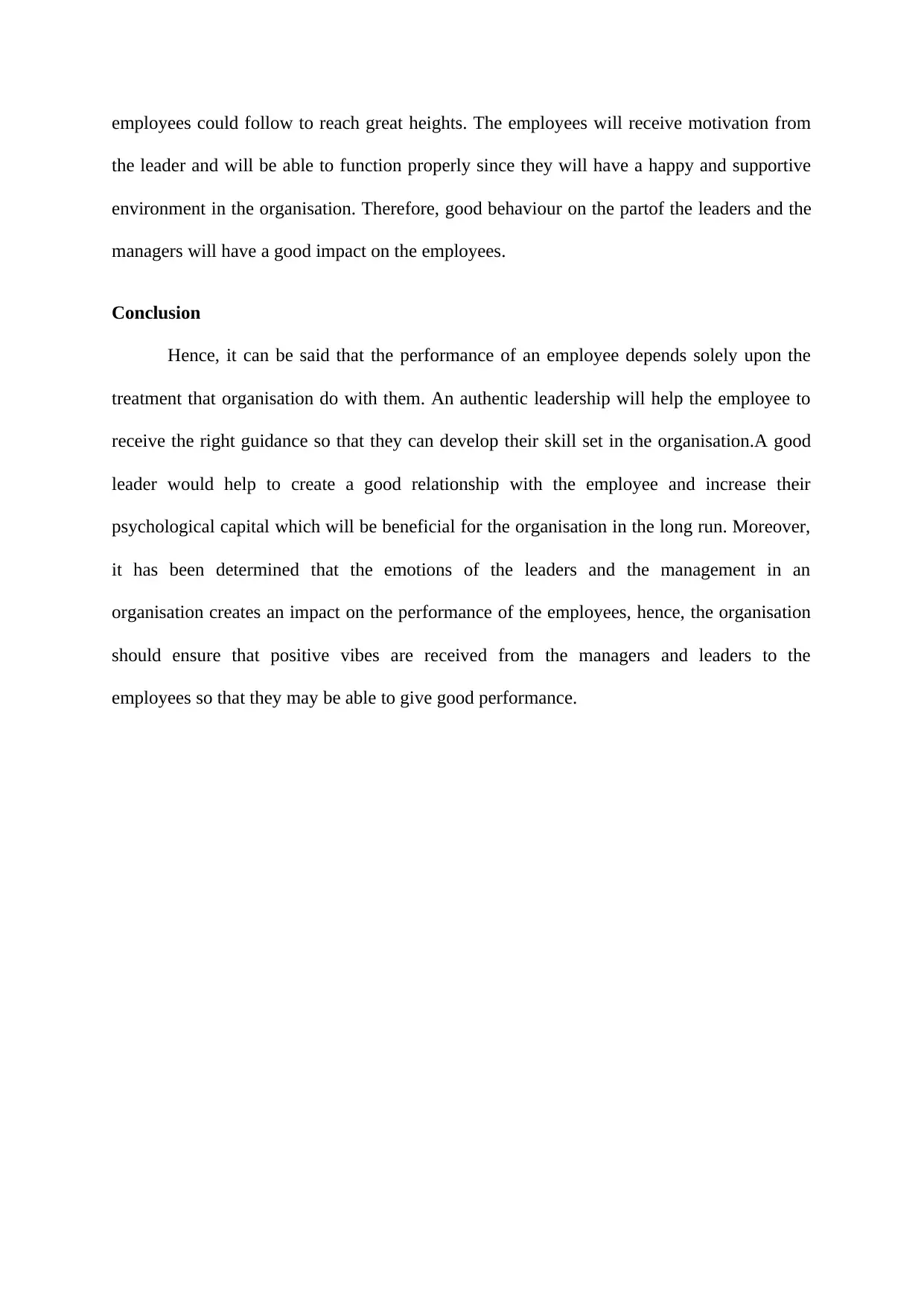
employees could follow to reach great heights. The employees will receive motivation from
the leader and will be able to function properly since they will have a happy and supportive
environment in the organisation. Therefore, good behaviour on the partof the leaders and the
managers will have a good impact on the employees.
Conclusion
Hence, it can be said that the performance of an employee depends solely upon the
treatment that organisation do with them. An authentic leadership will help the employee to
receive the right guidance so that they can develop their skill set in the organisation.A good
leader would help to create a good relationship with the employee and increase their
psychological capital which will be beneficial for the organisation in the long run. Moreover,
it has been determined that the emotions of the leaders and the management in an
organisation creates an impact on the performance of the employees, hence, the organisation
should ensure that positive vibes are received from the managers and leaders to the
employees so that they may be able to give good performance.
the leader and will be able to function properly since they will have a happy and supportive
environment in the organisation. Therefore, good behaviour on the partof the leaders and the
managers will have a good impact on the employees.
Conclusion
Hence, it can be said that the performance of an employee depends solely upon the
treatment that organisation do with them. An authentic leadership will help the employee to
receive the right guidance so that they can develop their skill set in the organisation.A good
leader would help to create a good relationship with the employee and increase their
psychological capital which will be beneficial for the organisation in the long run. Moreover,
it has been determined that the emotions of the leaders and the management in an
organisation creates an impact on the performance of the employees, hence, the organisation
should ensure that positive vibes are received from the managers and leaders to the
employees so that they may be able to give good performance.
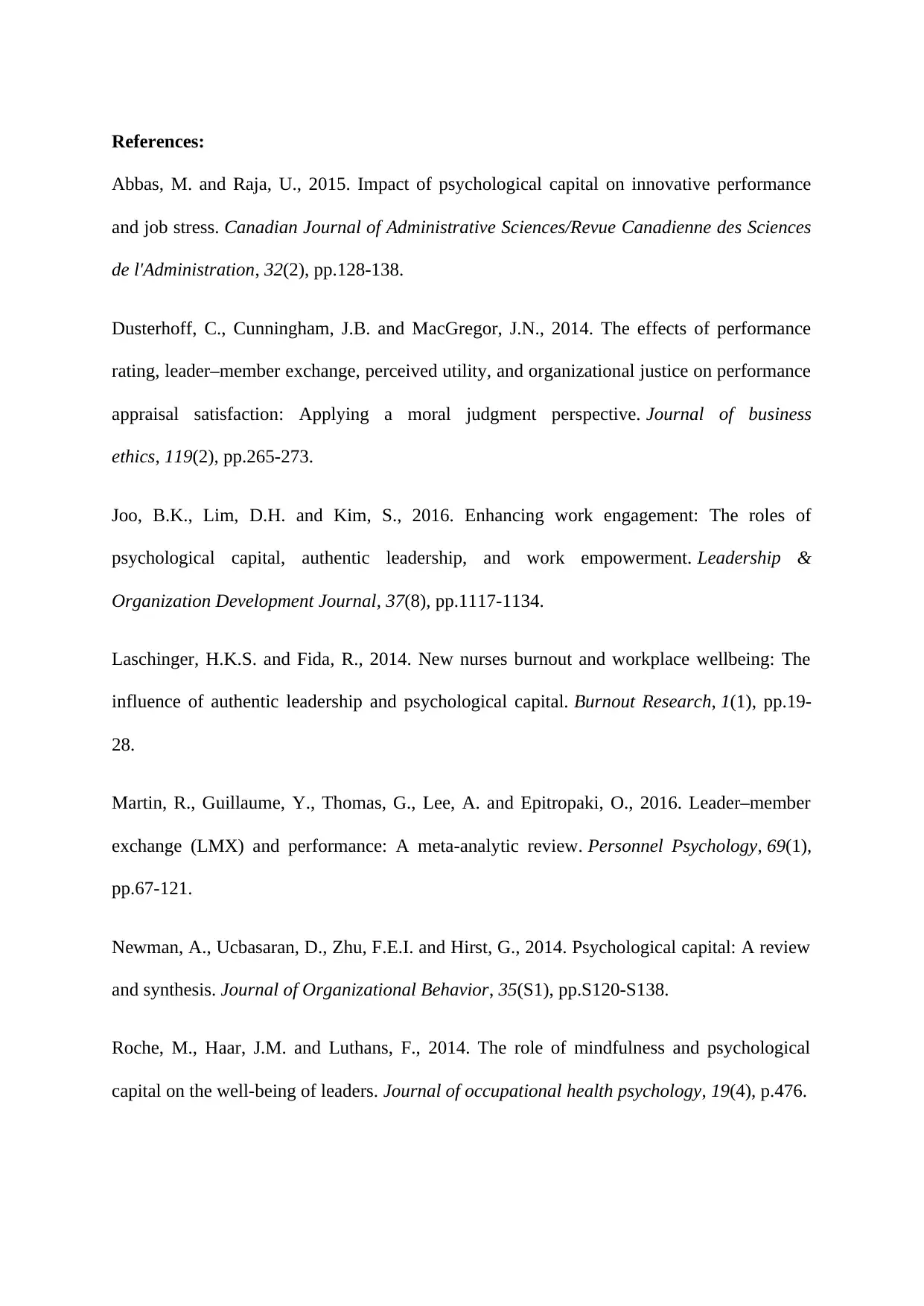
References:
Abbas, M. and Raja, U., 2015. Impact of psychological capital on innovative performance
and job stress. Canadian Journal of Administrative Sciences/Revue Canadienne des Sciences
de l'Administration, 32(2), pp.128-138.
Dusterhoff, C., Cunningham, J.B. and MacGregor, J.N., 2014. The effects of performance
rating, leader–member exchange, perceived utility, and organizational justice on performance
appraisal satisfaction: Applying a moral judgment perspective. Journal of business
ethics, 119(2), pp.265-273.
Joo, B.K., Lim, D.H. and Kim, S., 2016. Enhancing work engagement: The roles of
psychological capital, authentic leadership, and work empowerment. Leadership &
Organization Development Journal, 37(8), pp.1117-1134.
Laschinger, H.K.S. and Fida, R., 2014. New nurses burnout and workplace wellbeing: The
influence of authentic leadership and psychological capital. Burnout Research, 1(1), pp.19-
28.
Martin, R., Guillaume, Y., Thomas, G., Lee, A. and Epitropaki, O., 2016. Leader–member
exchange (LMX) and performance: A meta‐analytic review. Personnel Psychology, 69(1),
pp.67-121.
Newman, A., Ucbasaran, D., Zhu, F.E.I. and Hirst, G., 2014. Psychological capital: A review
and synthesis. Journal of Organizational Behavior, 35(S1), pp.S120-S138.
Roche, M., Haar, J.M. and Luthans, F., 2014. The role of mindfulness and psychological
capital on the well-being of leaders. Journal of occupational health psychology, 19(4), p.476.
Abbas, M. and Raja, U., 2015. Impact of psychological capital on innovative performance
and job stress. Canadian Journal of Administrative Sciences/Revue Canadienne des Sciences
de l'Administration, 32(2), pp.128-138.
Dusterhoff, C., Cunningham, J.B. and MacGregor, J.N., 2014. The effects of performance
rating, leader–member exchange, perceived utility, and organizational justice on performance
appraisal satisfaction: Applying a moral judgment perspective. Journal of business
ethics, 119(2), pp.265-273.
Joo, B.K., Lim, D.H. and Kim, S., 2016. Enhancing work engagement: The roles of
psychological capital, authentic leadership, and work empowerment. Leadership &
Organization Development Journal, 37(8), pp.1117-1134.
Laschinger, H.K.S. and Fida, R., 2014. New nurses burnout and workplace wellbeing: The
influence of authentic leadership and psychological capital. Burnout Research, 1(1), pp.19-
28.
Martin, R., Guillaume, Y., Thomas, G., Lee, A. and Epitropaki, O., 2016. Leader–member
exchange (LMX) and performance: A meta‐analytic review. Personnel Psychology, 69(1),
pp.67-121.
Newman, A., Ucbasaran, D., Zhu, F.E.I. and Hirst, G., 2014. Psychological capital: A review
and synthesis. Journal of Organizational Behavior, 35(S1), pp.S120-S138.
Roche, M., Haar, J.M. and Luthans, F., 2014. The role of mindfulness and psychological
capital on the well-being of leaders. Journal of occupational health psychology, 19(4), p.476.
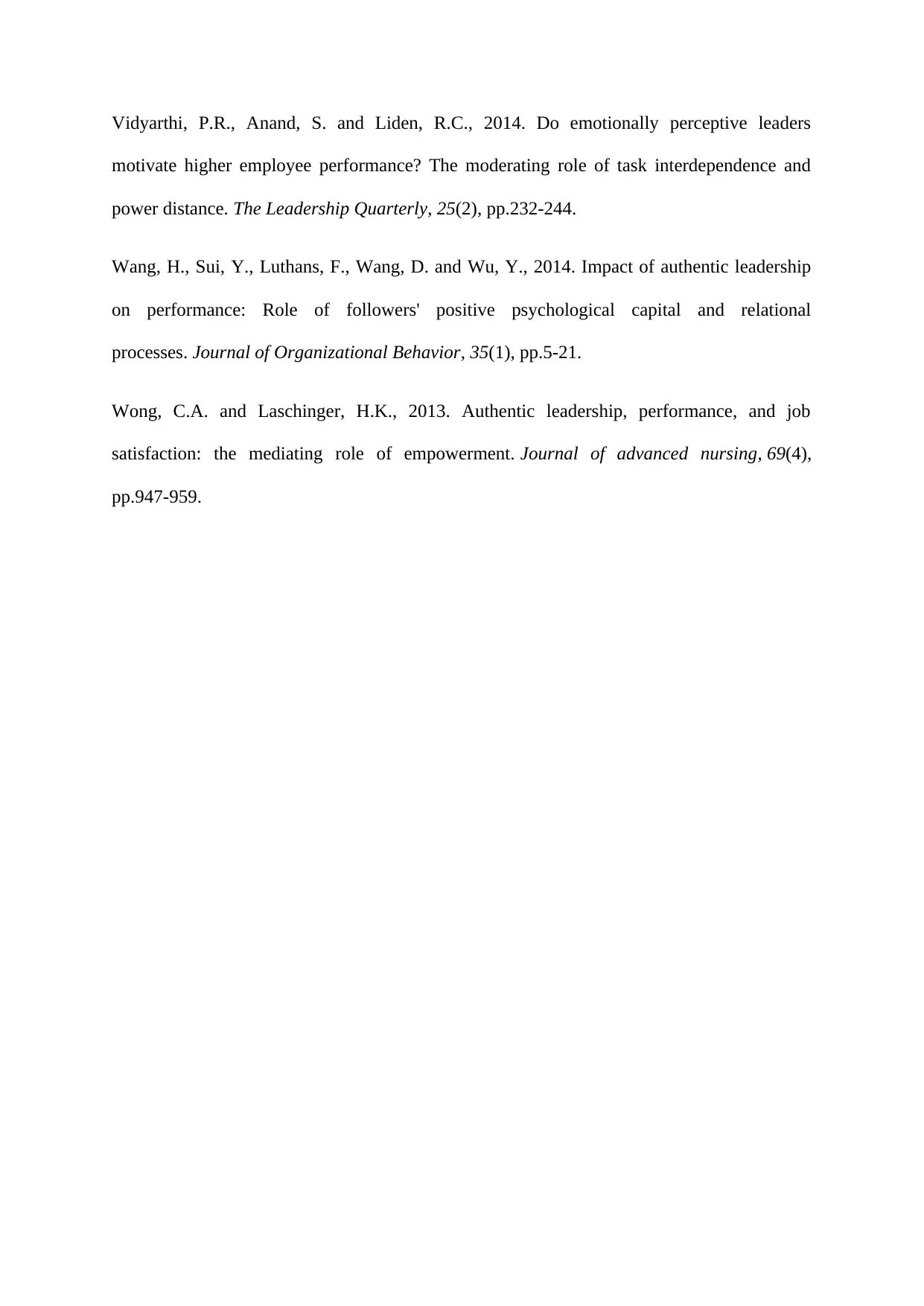
Vidyarthi, P.R., Anand, S. and Liden, R.C., 2014. Do emotionally perceptive leaders
motivate higher employee performance? The moderating role of task interdependence and
power distance. The Leadership Quarterly, 25(2), pp.232-244.
Wang, H., Sui, Y., Luthans, F., Wang, D. and Wu, Y., 2014. Impact of authentic leadership
on performance: Role of followers' positive psychological capital and relational
processes. Journal of Organizational Behavior, 35(1), pp.5-21.
Wong, C.A. and Laschinger, H.K., 2013. Authentic leadership, performance, and job
satisfaction: the mediating role of empowerment. Journal of advanced nursing, 69(4),
pp.947-959.
motivate higher employee performance? The moderating role of task interdependence and
power distance. The Leadership Quarterly, 25(2), pp.232-244.
Wang, H., Sui, Y., Luthans, F., Wang, D. and Wu, Y., 2014. Impact of authentic leadership
on performance: Role of followers' positive psychological capital and relational
processes. Journal of Organizational Behavior, 35(1), pp.5-21.
Wong, C.A. and Laschinger, H.K., 2013. Authentic leadership, performance, and job
satisfaction: the mediating role of empowerment. Journal of advanced nursing, 69(4),
pp.947-959.
1 out of 10
Related Documents
Your All-in-One AI-Powered Toolkit for Academic Success.
+13062052269
info@desklib.com
Available 24*7 on WhatsApp / Email
![[object Object]](/_next/static/media/star-bottom.7253800d.svg)
Unlock your academic potential
© 2024 | Zucol Services PVT LTD | All rights reserved.





